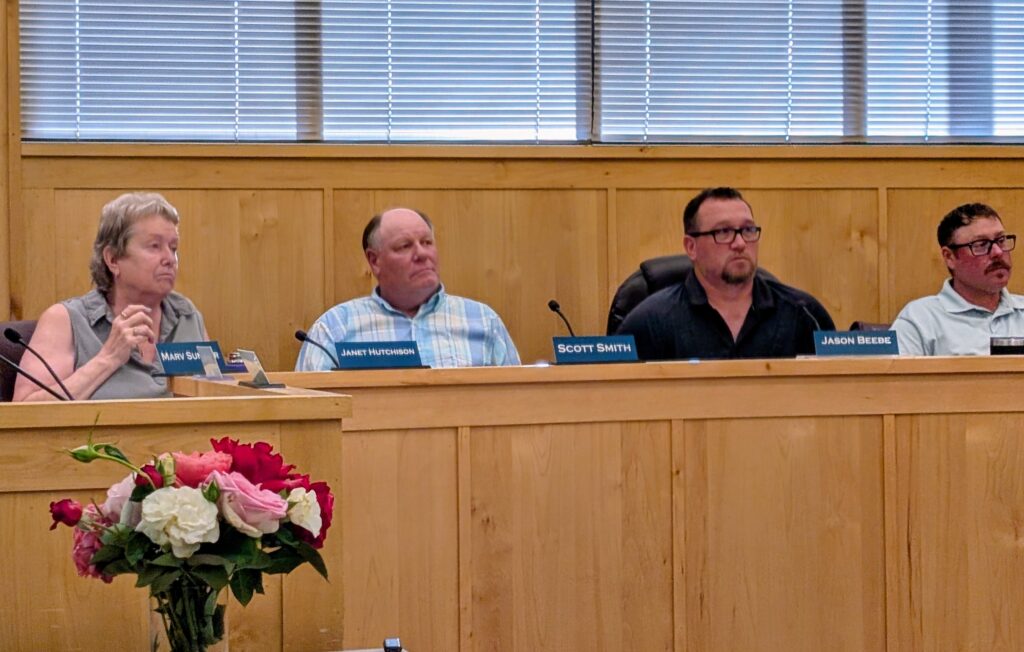
Prineville, Ore. — The majority of the Prineville City Council signaled resistance last week during its latest public meeting on the Mayor’s initiatives for allowing the public to testify remotely at council meetings, even as it weighs whether to expand video access—something already selectively offered to some individuals, including members of the council. However, remote testimony is already required to be allowed for the public under Oregon’s Public Meeting Law, regardless of whether the council shares video of itself.
The Prineville City Council currently allows remote attendance by telephone/audio only. However, attendees frequently are unable to provide testimony through remote audio, either because they have zero instruction on how to unmute or because the offer is not even made during such comment periods, as was the case at the most recent meeting.
The council’s discussion, prompted at the request of Mayor Jason Beebe, who has been leading the effort for increased public transparency and public participation, considered three staff-proposed considerations: live-streaming meetings, archiving recordings for later access, and allowing virtual public testimony. But a majority of councilors appeared opposed to offering the public a means to view them—unless it came with outright restrictions on remote testimony, ensuring that only those physically present could testify.
Beebe’s proposal for video was also focused on enabling video of the counsel itself, and did not appear to be a proposal for the public to share their own video, which isn’t common with most public bodies that enable video and livestreaming of meetings.
The councilors’ statements also appear to reveal that the current procedures have effectively prevented remote testimony in recent times, or simply that they would roll back the remote attendance right in violation of Oregon law.
Although councilors did not expressly vote to block video access, their comments suggested they would only support universal video availability if accompanied by a requirement that testimony still be limited to those attending in person, with only narrow exceptions under the Americans with Disabilities Act (ADA), which would require specific requests for accommodations.
Oregon’s law mandating remote testimony under ORS 192.670 is not dependent on a request for accommodations under the ADA. So long as anyone is provided the opportunity to testify in person, public comment remotely must be allowed.
The only means currently for video of the City’s public meetings has been through occasional livestreams or recordings provided by the Prineville Review. The City cannot prevent the news media or public at large from recording or livestreaming the meetings themselves, but its failure to provide video streaming does require physical attendance, which is often costly for local journalists to cover consistently. The quality can often be limited as audio is not tied to the council’s own audio system.
But according to ORS 192.670(1), public bodies conducting meetings via electronic or telephonic means must make “reasonable efforts” to allow public testimony through those same channels. The requirement does not hinge on video being provided or the nature of a participant’s disability status.
Despite that legal obligation, the City of Prineville currently disables video access for members of the public during meetings while allowing remote video participation for select individuals—including councilors, staff, and presenters. Critics argue this constitutes discriminatory treatment and inhibits public engagement, especially for residents who are unable to attend in person due to scheduling, transportation, disability, or lack of child care on a weekday evening. Several citizens have further alleged that the policy amounts to a conditional violation of free speech rights, as those denied video access are also unable to record proceedings in the same manner available to remote city officials.
The Prineville Review has also raised arguments against the city, which has an absolute requirement to provide the same means of remote access during executive sessions if any official is attending remotely. While closed to the public, representatives of the news media are required by law to have access to most executive sessions.
City Attorney Jered Reid also claimed that staff had argued that providing video of the meetings would likely prevent members of the public from providing testimony if livestreaming or past video recordings were uploaded.
“There’s an argument that that would create a chilling effect.”
Mayor Beebe quickly questioned the claim: “So an item in item number two, you talked about a chilling effect. What? What’s the effect that can be had? Is it, is there a concern for privacy for citizens, or?”
“Sometimes people do not want to be in a viral video if they were to testify,” Reid claimed.
Reid did not specifically address recordings that could be taken by others in attendance, and whether the City believed it had ever had a “chilling effect”. The majority of other local bodies provide for livestreaming and recording without noticeable impacts on testimony, including Crook County government and numerous other much smaller special districts and committees.
The Prineville Review has made efforts to record as many of the City Council’s meetings as possible, but our livestream recordings do not have the benefits of the City’s existing audio integration to provide clarity to remote viewers.
Mayor Beebe said his intent was to allow residents to “see who’s talking” and view presentations that are typically projected in the council chambers but not accessible to listeners calling in by phone. “They want to watch us,” he said. “They want a visual of what’s going on.” Beebe also acknowledged that the city previously provided Zoom-based live streams during the COVID-19 pandemic, though it’s unclear whether remote testimony was allowed at that time.
While the city has occasionally permitted testimony by phone, members of the public have often been unclear on how to unmute themselves or whether they were allowed to speak. And providing video access to viewers—without enabling their own video—would not inherently expand testimony rights or complicate meeting procedures, according to advocates for adding video to meetings.
City IT Director James Wilson confirmed that the cost of livestreaming and archiving recordings would be minimal under existing records law, with any increase largely limited to subscription services. “Currently it’s not insurmountable,” Wilson said.
Despite the legal framework and low cost, most councilors appeared unwilling to consider allowing remote testimony as part of any video access policy, instead leaning toward a policy that would expand video viewing access only while tightening limits on remote public participation.
Councilor Steve Uffelman stated, “If it’s important enough for a public person to want to attend or to testify, and whatnot, I think they need to be willing to come and be present before us,” said Councilor Steve Uffleman. “I’m not, I’m not real excited about bending over backwards and creating all sorts of alternatives to make it convenient for them.”
Councilor Jerry Brummer, who was recently seated on the Council, also agreed with the position. Brummer currently serves on the Crook County Fire Board, Crook County Ag Extension Service District, and is also a former long-time Crook County Commissioner.
“I agree with what Steve (Uffleman) said. I think as long as long as we have the place that the people with disabilities can call ahead of time those people, I think everybody else should be able to make a meeting if it’s important to them, then they can be here,” said Brummer.
Councilor Scott Smith took an equal position alongside Uffleman, saying that remote testimony should only be granted if an accommodation under the ADA was provided.
“I have no problem with option number one, other than I’m very adamant, too, that if you want to address the council, that needs to be here in person,” said Smith.
Smith also refused to comment on his position following the meeting, but had previously signaled he would no longer speak with the Prineville Review when he provided heated responses and was repeatedly shouting at this reporter after another recent council meeting.
Smith was unquestionably unhappy with repeated questioning by this publication, which he continually deflected with his responses, related to a separate ongoing investigation by the Prineville Review into a contracted City official’s business relationships that raised potential ethics questions surrounding the recent biomass facility. Smith is allegedly a friend and former work colleague of the contracted official and previously a long-time employee of the City.
When contacted after the meeting, most councilors declined to respond to requests for comment—except Councilor Marv Sumner, who did not participate in the meeting discussion and whom the Prineville Review did not have an opportunity to question. Councilor Uffelman declined to comment and said he would only provide comment in writing, while Hutchinson said she didn’t have time.
Mayor Beebe was the only official who agreed to comment but declined to say whether he supported or opposed the calls from other councilors to restrict remote testimony access even further.
City Manager Steve Forrester also refused to comment—repeatedly and aggressively. According to one source familiar with the situation, who spoke on condition of anonymity, Forrester has continued what amounts to an informal media blacklist against the Prineville Review. The source said Forrester’s refusal to speak stems from what he views as past unfavorable coverage of city operations by this publication last year.
Mayor Beebe has been the only member of the council to consistently speak with the Prineville Review, and reportedly to the public at large. During recent controversies involving the city’s effort to bring a biomass plant to Prineville, numerous residents have expressed to the Prineville Review that the council appears to avoid engaging much with the public or with the media. On the other side, even dissenters of Mayor Beebe have thanked him for his more open engagement with the public, including through a newer official Facebook page created by Beebe.
Public interest in transparency has grown in recent months, with increasing calls to restore or expand remote access to city proceedings. Critics point out that even small rural special districts across Oregon now routinely provide full remote video access to meetings. The City of Prineville’s position, they argue, is not only inconsistent with the law but increasingly out of touch with public expectations.
Council consensus ultimately favored developing a policy that would support live-streaming meetings and archiving recordings—but only with continued restrictions on public testimony. No action was ultimately taken, and Mayor Beebe’s efforts to improve transparency appear to be dead in their tracks. If so, such an outcome is likely to lead to increasing frustration among the growing proponents calling for increased access and transparency, and could become a policy position focused on in upcoming elections.
Reid did appear to signal that he would move forward with drafting a policy around providing livestream video, but is yet to be determined if that will include language that specifically prohibits remote testimony, and if not, the current position of the councilors appears to signal it would not support such a policy.
The stance against remote testimony by the councilors also comes after nearly all council members have completed the required public meetings training mandated under a recent Oregon law and provided by the Oregon Government Ethics Commission, according to Mayor Beebe. In February, the City hosted the OGEC, which provided an in-person public meetings training for officials from numerous public bodies in Crook County.
Note: This story was updated after publication to include links and a sentence structure fix in the first paragraph.
(Editor’s Note: Until such time that the City Council may provide video of its meetings, then Prineville Review will strive to provide livestreams or recordings of the meetings as much as possible amid ongoing requests from our readers. Please subscribe to us on Youtube as we work to meet the minimum subscriber counts to livestream there. Currently, our livestreams are limited to Facebook.)
Mr. Alderman is an investigative journalist specializing in government transparency, non-profit accountability, consumer protection, and is a subject matter expert on Oregon’s public records and meetings laws. As a former U.S. Army Military Police Officer, he brings a disciplined investigative approach to his reporting that has frequently exposed ethics violations, financial mismanagement, and transparency failures by public officials and agencies.





